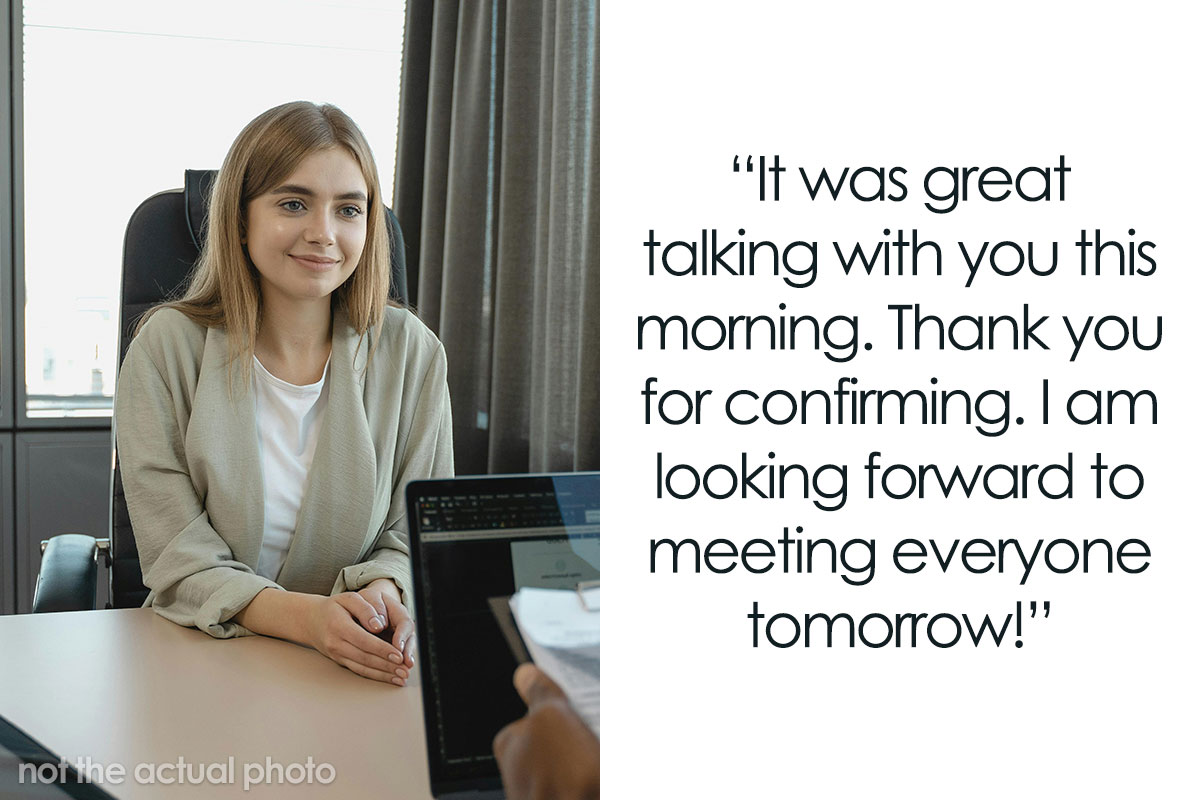
“You Dodged A Bullet”: People Applaud Lady For Standing Her Ground During Salary Talk With Recruiter
Interview With ExpertThere are so many hacks for having the best job interview. Many of them essentially involve playing verbal ping-pong with the interviewer. Getting to the job interview round also takes a lot of work, and there may be hiccups to deal with.
This is what happened to a woman who didn’t realize that her refusal to mention her last post’s salary would affect her chances of getting to the interview stage. She took to Reddit to share screenshots of her conversation with the recruiter and express her frustration about the situation.
More info: Reddit
Lady refuses to disclose current salary and recruiter refuses to disclose budget for the position, company decides to cancel her interview over the standoff
Image credits: Tima Miroshnichenko (not the actual photo)
The recruiter emailed the woman and asked about her current salary ahead of the interview, stating that the manager may not want to speak about it in person as it’s “awkward”
Image credits: Sora Shimazaki (not the actual photo)
The woman said that she didn’t want to disclose her salary but mentioned that she expected to be paid $90-95,000 a year, depending on the benefits offered
Image credits: Karolina Kaboompics (not the actual photo)
The recruiter immediately told her that her salary expectation didn’t align with their salary structure, but when she questioned them, they refused to disclose their budget
Image credits: Forestfernweh
This back and forth led to the woman’s interview being canceled without further discussion
Navigating the minefields before and after job interviews can be difficult, and candidates can often get stuck in these steps. That’s why Bored Panda contacted Farhan Raja, the founder of Job Interviewology, who specializes in executive interview coaching and has over a decade of industry experience. We asked him if it’s legal for companies to ask candidates about their past salary.
He said, “it’s not illegal for an organization to ask about your current salary, they have every right to ask, even though it can feel intrusive. In the same spirit you also have every right not to disclose it. However, not disclosing this particular piece of information can ruffle the feathers of your prospective employer, because when they ask such a question, they expect a compliant response.”
Before you apply for a new job, you can also find out your state’s laws regarding salary history. In certain places, even if the hiring managers ask you about your past salary, you’re not obligated to reply. As Farhan mentioned, you should carefully consider the consequences of refusing to answer. Not revealing it might cost you the job but mentioning it may lead to salary discrimination.
Research shows that many companies might try to lowball prospective workers. Some ask the question to gauge market rates, while others do it so that they can hit you with the lowest possible offer. This has traditionally been an issue for women who, on average, earn less than men. Asking about salary history could lead to discrimination against marginalized groups.
Farhan mentioned a diplomatic way of answering the salary question without upsetting one’s potential employer. You can say, “I prefer not to share my current salary. However, one thing I can say is that the salary range for this role fits in to my salary expectations. We’ve had a really positive conversation today and I’ve really enjoyed the interview, so on that basis, I would like to throw the ball in your court. If you were to make me an offer which you believe is reflective of my interview performance and experience, there is no reason that I would say no.”
Image credits: Justin Morgan (not the actual photo)
As many commenters mentioned, salary transparency is so important. Companies should be forthright about their budget if they also expect workers to mention their current salary. In fact, New York City passed a bill requiring employers to post the salary range for job openings and to mention all the other benefits that come with the post. Other places have also noticed this initiative, and, who knows, maybe it might lead to change.
Farhan stated that “companies have budgets and the salary range that they provide on the job advert is usually reflective of how much budget they have. However, companies are businesses and ultimately they’re trying to get the best deal for themselves. Hence they feel it’s important for them to know how much you’re earning, so they gauge how much salary they should offer (and save a bit of money).”
As for the poster’s experience, Farhan mentioned that “a woman should hold her ground just as any man would. If a company is potentially going to respond to men and women differently because of their gender, then that should be considered a big a red flag and a company to be avoided.” In this case, it’s hard to pinpoint whether the company was discriminating against the woman because of her gender or whether they simply didn’t want to pay her more.
Nevertheless, as some netizens said, maybe she got saved from a potentially bad job. If the recruiter was acting so coy about the budget yet still questioning her about her salary, maybe that was one red flag too many. Although it cost her this job, hopefully, there will be better opportunities later on. Let us know your job interview horror stories, and tell us if you’ve ever been questioned like this about your current salary.
People shared some humorous ways that the poster could have served up an uno reverse to the recruiter
Poll Question
Thanks! Check out the results:
As someone working in HR (and handles recruitment) the salary range on offer is THE FIRST thing to be disclosed, and I never ask what the candidate’s current salary is. If they offer it up to me, I usually add another 5k in my notes so the client goes above ie - candidate earns 90, I put 95, client goes to 100k as new offer for role, candidate ends up 10k richer. My role in HR is to look out for the company, and I do, but my role as a person is to ensure other people can survive on what my company is offering.
As someone who doesn't work in an office/white collar setting, just reading that brief exchange was exhausting. I feel like the insincerity just oozes out of every word.
I'm so glad I don't work in an office anymore. All that falseness and thanking people who were just dickheads to you is something I couldn't force myself to do anymore. I fear I'd just tell them what I really thought.
Load More Replies...As someone working in HR (and handles recruitment) the salary range on offer is THE FIRST thing to be disclosed, and I never ask what the candidate’s current salary is. If they offer it up to me, I usually add another 5k in my notes so the client goes above ie - candidate earns 90, I put 95, client goes to 100k as new offer for role, candidate ends up 10k richer. My role in HR is to look out for the company, and I do, but my role as a person is to ensure other people can survive on what my company is offering.
As someone who doesn't work in an office/white collar setting, just reading that brief exchange was exhausting. I feel like the insincerity just oozes out of every word.
I'm so glad I don't work in an office anymore. All that falseness and thanking people who were just dickheads to you is something I couldn't force myself to do anymore. I fear I'd just tell them what I really thought.
Load More Replies...
 Dark Mode
Dark Mode 

 No fees, cancel anytime
No fees, cancel anytime 













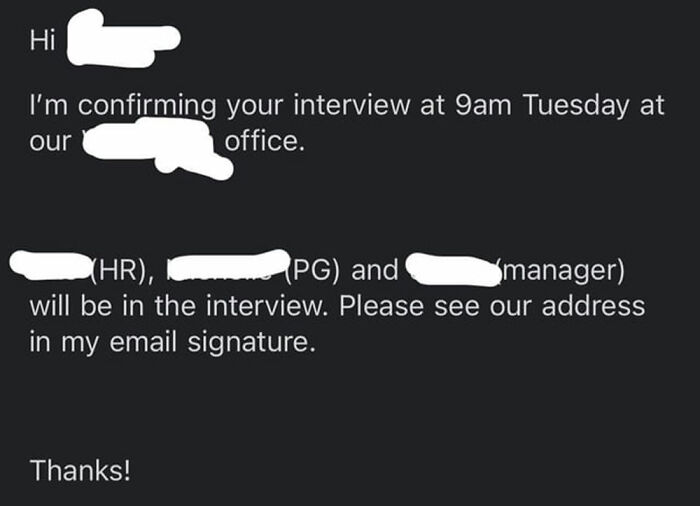

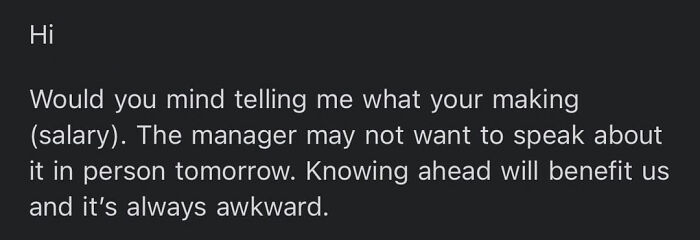

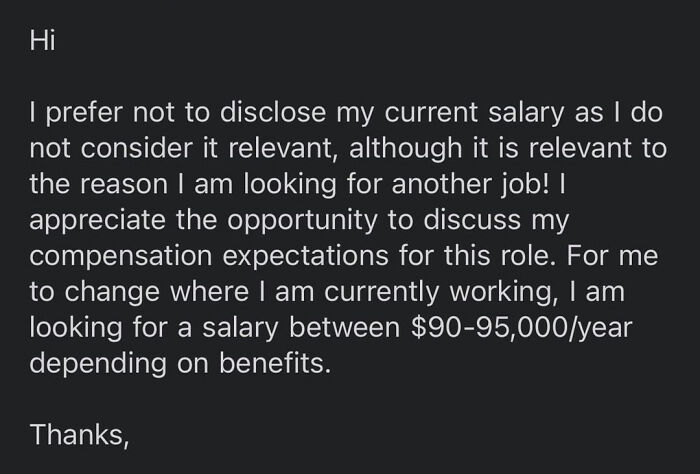
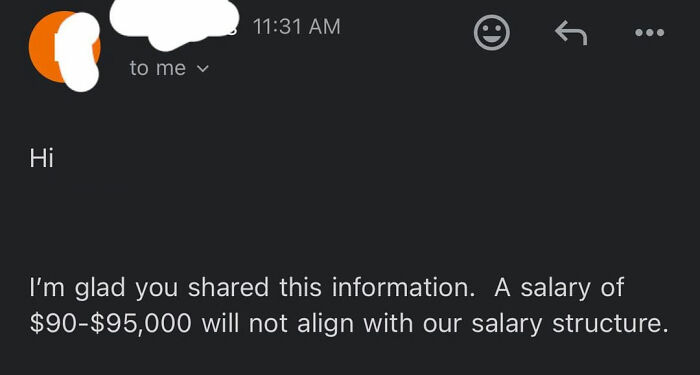

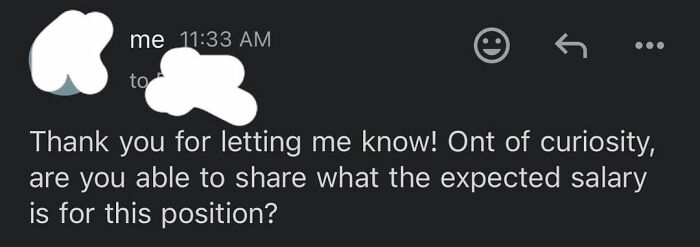
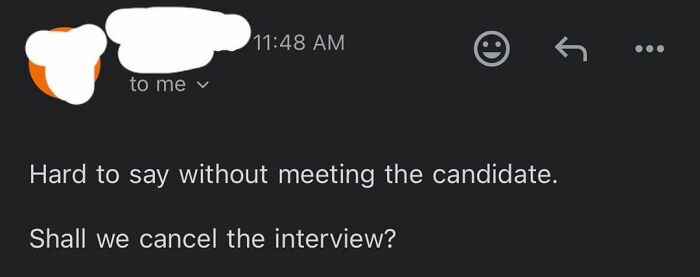
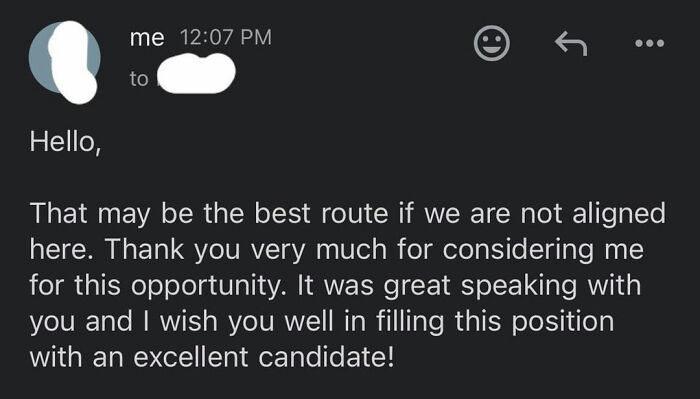


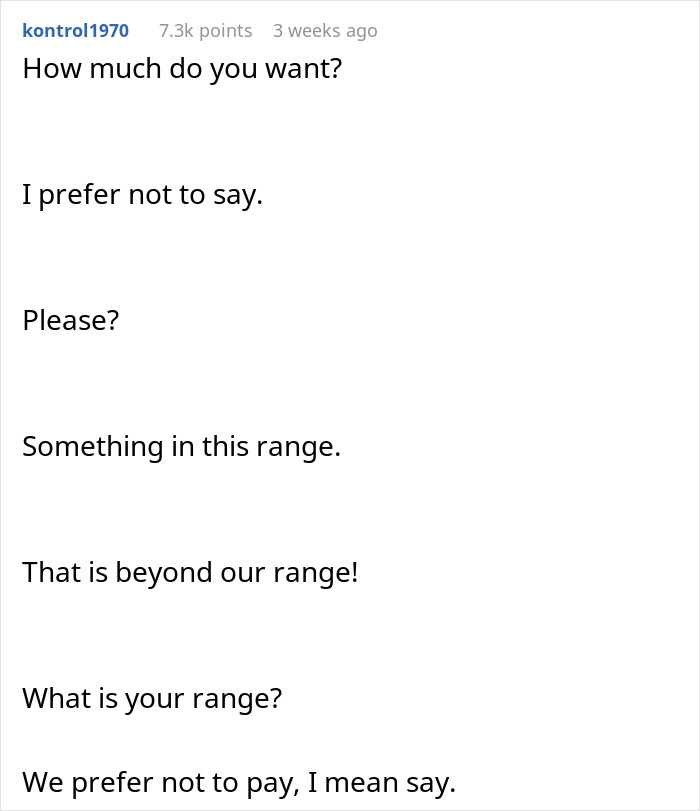



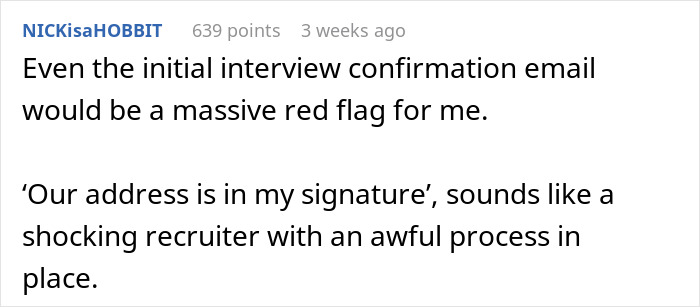

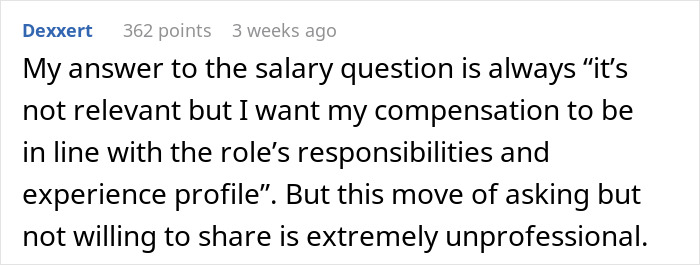







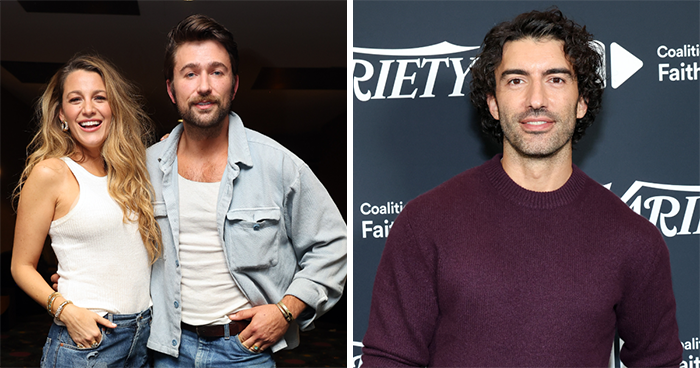







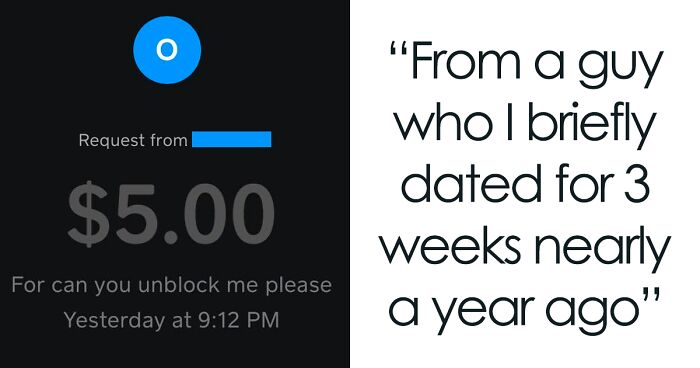



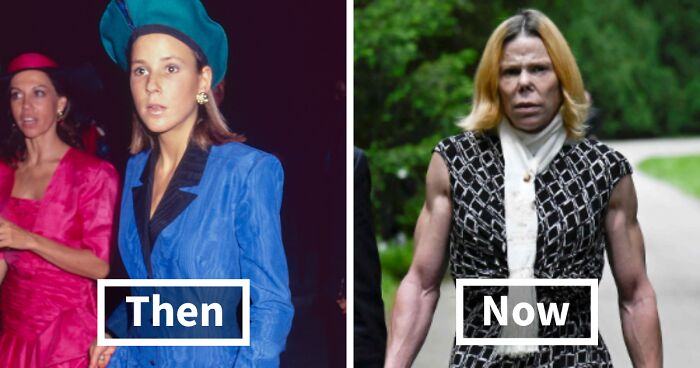





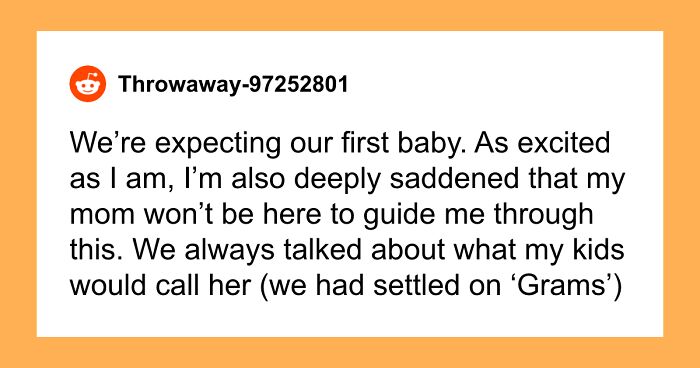
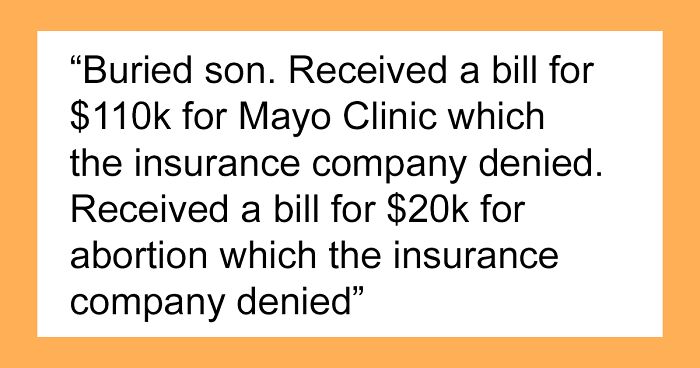
66
42